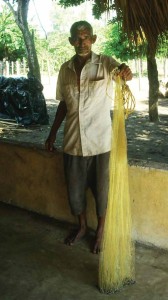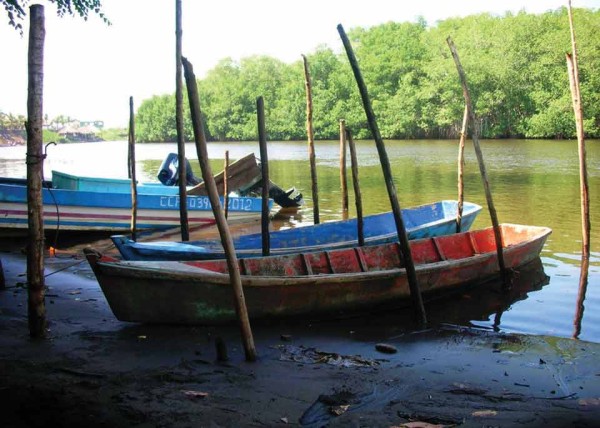Master Fisherman, Paustino Cruz Colindres
I had the privilege to talk with local fisherman Paustino Cruz Colindres, who has been fishing the waters around El Paredón for 45 years. Paustino, 72, sat down with me over a cup of coffee to tell me a little more about artisanal fishing and then we went to go try our luck down on the water. Puastino has fished all waters—the ocean, the river canal and the mangroves. His favorite place to fish is a place called La Boca Barra, where the river canal empties into the ocean. This area is notoriously difficult to fish and a bit dangerous in a wooden canoe with no motor. Paustino has to carefully select the time to fish this spot in accordance with the tide. He told me that when the tide is coming in, there is about one hour of equilibrium between the incoming tide and outgoing currents that allows him to enter this area to fish. Why risk fishing this area when turbulent waters could easily capsize a small boat? As any fisherman or woman knows, the draw is the fish and the fact that the biggest fish tend to congregate in this area. The chance of hooking into that prize can lead you to take a few chances.
And how does Paustino prepare to go out to fish? He sets his schedule based on the tides and the moon, his schedule changing daily to follow the movement of this cycle. He may get up at 4 a.m. and grab his net to catch the live shrimp and little fish, which he’ll use as bait later in the day. He tells me the fishing is always better during the full moon when the night lights up like the day. He’ll go out alone in his canoe with his paddle and fishing line and pull in fish such as the tasty robalo (snook), pargo (red snapper) and mojarra (tilapia).
When I asked what the biggest fish he ever caught was, I caught a sparkle in his eye as he shared with me his adventure of hooking into a 42-pound robalo at La Boca Barra. He battled that fish for over an hour, paddle in one hand, line in the other with the fish pulling his boat all over the canal. He successfully landed his prize and made it back to the village with quite the story to tell. When I asked how the line didn’t cut his hand with a fish that big and powerful, he explained that the fishermen there use a finger from a rubber glove to protect their finger from being sliced by the line.
After all that talk of fishing and the excitement of landing the big one, I decided it was time for me to grab my hand line and test my luck. Fishing is a language all of its own. Even if you don’t speak the local language, if you fish, you can travel the world and connect with other fishermen. This invisible bond just exists among those who share the joy of fishing, and that was proven again to me that day, talking fishing tales and techniques, with my local friend Paustino.

